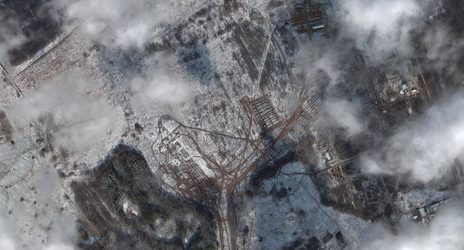
Preventing major conflicts like a Russia-Ukraine war is hugely important. But figuring out how is really hard.
As I’m writing this, a Russian invasion of eastern Ukraine looks quite possible.
The “superforecasters” at the Good Judgment Project, an organization led by professors at the University of Pennsylvania that recruits non-professional forecasters and collates the predictions of the most historically accurate among them, went from predicting peace to narrowly predicting a war in recent days. Despite their lack of credentials, the superforecasters have a pretty strong track record at this kind of prediction; in the past, they’ve outperformed intelligence analysts who have access to classified data.
It’s always possible, of course, that Russia’s extensive military buildup on its borders with Ukraine, and those of its ally Belarus, is a feint meant to extract concessions from the West, like a promise that Ukraine will never join NATO. In the past 24 hours, Russia announced it was pulling back some troops from the Ukrainian border, a hopeful sign that the standoff could resolve without bloodshed. But some observers remain skeptical that the pullback is real, and Russia remains in a position to launch an invasion if it so chooses.
Such a war would be a humanitarian disaster. Russia might be able to quickly take the eastern half of the country and perhaps even the capital of Kyiv, according to US intelligence assessments. But the Ukrainian government has ramped up civilian training in guerrilla tactics, so Ukrainians can continue an insurgency even if Russian forces occupy some or all of the country.
It’s not hard to imagine a lengthy, brutal conflict akin to the Syrian civil war, with thousands or perhaps hundreds of thousands of deaths, taking place within Europe itself. In one sense, the Ukraine-Russia standoff is primarily a regional conflict. But some observers believe it could mean far more.
David Sanger, the longtime New York Times national security reporter, proclaimed “the return of superpower conflict.” Johns Hopkins historian Hal Brands went further, stating, “the return of great-power competition has brought with it the return of nuclear rivalry” between Washington and Moscow, but also between Washington and Beijing (whose greater power and wealth than Moscow makes it a more formidable and global long-run rival to the US).
If that’s true, the implications are foreboding for basically all humanity. But is it true — or is this another case of war hype?
We don’t know a whole lot about why great powers fight
I’m sorry to disappoint, but the answer is simple: I have no idea, and neither does anybody else.
The truth is that understanding interstate war, and war in general, is really, really hard, and the attempt to develop rigorous, testable theories about when such wars break out and why is still in its infancy. Studying war is hard for the simple reason that we lack sufficient data points.
Let’s say you wanted to build a quantitative model to predict, say, how likely inflation is to exceed 7 percent in the US for the rest of the year. We have monthly inflation statistics going back to at least 1947, along with breakdowns of price changes by goods versus services, by types of goods and services, etc. We have surveys of economists and business executives and consumers about what they expect to happen to inflation. Modelers, in other words, have a lot to work with.
Studying war is not like that. New wars, thankfully, do not begin every single month. Subnational conflicts like civil wars are much more likely than interstate wars these days, which gives researchers focused on intrastate wars an edge; political scientist Chris Blattman’s forthcoming book Why We Fight promises to be a solid overview of that literature.
But if you’re interested in wars between “great powers,” as many are in light of the Ukraine standoff and tensions in the Taiwan Strait, the pickings are very slim. From the 20th century onward, you have World War I, World War II, the “Cold War” (which was quite bloody) as a whole, and … that’s about it. Maybe the Korean War, too, if we somewhat dubiously count impoverished post-revolutionary China as a great power (and don’t count include it as part of the greater Cold War). That’s about three or four data points, against the 900 and counting of the monthly Consumer Price Index.
Many theories, not much data
Of course, the paucity of data hasn’t stopped international relations scholars and others from proposing theories to explain why that data is so sparse.
There are the offensive realists, who think every state wants to achieve at least regional hegemony and will fight to maintain it; the defensive realists, who think every state’s core drive is for survival; the “democratic peace” liberals, who think the liberal values and open communication of representative governments prevent war; and the constructivists, who emphasize that what counts as international security varies from time to time and place to place.
There’s a lot of thoughtful work in international relations theory, but all of it struggles with the fundamental problem of poor data.
John Mearsheimer, perhaps the most flamboyant and confident theorist there is, was widely mocked for predicting in 1990 that Europe would devolve into great power conflict after the Cold War and that NATO would dissolve in the absence of a Soviet threat to unite it.
But his equally criticized argument in 1993 that Ukraine should keep its Soviet-era nuclear weapons as a deterrent against conquest looks … somewhat prescient, in light of Ukraine’s possible conquest by a nuclear power. Ukrainian nukes would probably be bad for the world — but they’d be an awfully good card for Ukraine to play right now.
Does that make Mearsheimer’s theory right? Wrong? Incomplete? It’s just very difficult to say without more data.
It’s possible to learn more from more careful theorists. Blattman has a thoughtful piece on the Ukraine situation positing some reasons Ukraine and Russia have been unable to resolve the standoff diplomatically. But most researchers also recognize the many limits of what we can know about international conflict.
Take Bear Braumoeller of Ohio State; his recent book, Only the Dead, is a compelling argument against recent contentions from Steven Pinker and others that war is declining. There’s no reason to conclude that war’s incidence is decreasing, Braumoeller convincingly demonstrates. Among other things, the rate of war initiation has, if anything, slightly increased in the past 200 years. It’s declined since the end of the Cold War, but 30 years isn’t very long in the context of geopolitics.
But what can we say about trends in warfare? Here, Braumoeller is responsibly circumspect. It seems, he concludes, that efforts to build a stable peaceful international order (like the Congress of Vienna regime in 19th-century Europe) can mitigate conflict. But, of course, building such an order is much easier said than done.
On a personal level, this question feels like an area where different parts of my life are colliding. Decades ago, in the wake of the Iraq War, I grew obsessed for years with IR theory and the questions it raises, before abandoning it largely because I grew frustrated with how hard it was to determine which theories were valid and which were not.
And recently, effective altruists, a community I’m a part of and passionate about, have embraced great power war as a possible existential risk, not least because it could drive governments to develop new, dangerous weapons that threaten all of humanity (like armed AI systems or biological agents).
A Russian invasion of Ukraine, specifically, could have spiraling consequences that anyone of a humanitarian bent should take seriously. It could, for instance, disrupt the global supply of wheat and raise food prices, which could lead to increased hunger in the world’s poorest countries, far from the battlefield. Such aftershocks were of course common in the age of widespread European land war; if they seem shocking now, it may just be because we’ve enjoyed a brief respite from that pattern.
“How do we prevent great power wars” is an important question. I just am not particularly optimistic about how rigorously we are going to be able to answer it.
A version of this story was initially published in the Future Perfect newsletter. Sign up here to subscribe!





